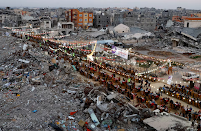Friedrich Merz also
stated that he had been notified of the attacks in advance, adding that not
attacking Iranians was not an "option" for Israelis, who, he claimed,
had the right to "defend themselves." Israel carried out the attacks,
killing over 1000 Iranians in the process, claiming they were intended to
prevent Iran from developing nuclear weapons.
The International
Atomic Energy Agency (IAEA) had found no evidence that Iran was moving toward
nuclear weapons—a fact most recently reiterated by the UN nuclear watchdog’s
Director-General, Rafael Grossi, last week. Israel's decision to launch an
all-out war against Iran brought the region to the brink of a conflagration
that, had it not been contained, would have had long-lasting reverberations not
only for West Asia but also for the Western world, a fact Germany was fully
aware of when it backed the action.
New information
obtained by the Tehran Times reveals that Germany’s support for Israel during
the 12-day war extended beyond political and diplomatic statements. Berlin, in
fact, played an active role in helping Israel achieve its war goals by
deploying troops to the occupied territories.
A member of the
Israeli army with knowledge of the matter has told Iranian intelligence that a
group of German military forces was stationed in Israel at the request of the
regime during the 12-day war. They participated in military operations, under
an agreement that required Israel to keep Germany’s involvement a secret. The
agreement was made in confidentiality between German and Israeli commanders,
but it has been obtained by Iranians.
Germany’s aid to
Israel marks the second time it has joined an aggressor against Iran. Berlin
also supplied Iraqi Dictator Saddam Hussein with chemical weapons, which he
used during his invasion of Iran in the 1980s.
The Tehran Times
understands that German troops were financially compensated for their service
to Israel but chose to leave the occupied territories immediately after the war
ended despite their initial promises. As the conflict escalated and Iran
targeted several military and sensitive sites, the Israelis discovered that the
German forces were reluctant to continue their involvement.
According to a
leaked Israeli assessment, the German forces’ departure unnerved the regime.
Zionists were content with how France participated in the war on Israel’s
behalf.
It remains unclear
whether the German parliament approved the deployment. The German government is
constitutionally prohibited from sending troops to a foreign war on its own
initiative and is legally required to seek a majority vote in the Bundestag
first. This system was deliberately established after World War II to prevent
the executive branch from unilaterally initiating war.
The Tehran Times
has been informed that details regarding the names of the German personnel
involved, the nature of the collaboration, and supporting documentation have been
made available to Iran.
The revelation
comes as Israel grapples with what Hebrew media calls a "spy crisis."
According to a report by Israel's Internal Security Agency (SHINBET), espionage
cases in Israel increased by approximately 400 percent in 2024. That figure is
expected to have risen further in the first half of 2025.
Several Israelis
have been arrested on espionage charges in recent months, with the regime
linking almost all of them to Iran.
Iran’s Intelligence
Minister Esmaeil Khatib has stated that a large number of Israelis collaborate
with Iran either for money or out of hatred towards Israeli Prime Minister
Benjamin Netanyahu.



















